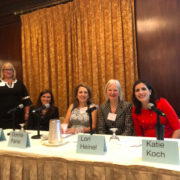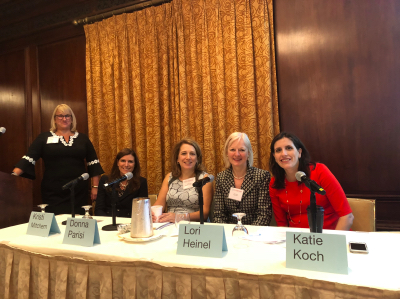The 10th Annual Top Women on the Buyside event coverage: What will the future bring for the Asset Management Industry?
By Melissa Anderson
Artificial intelligence, big data and technology generally will impact the asset management industry in a big way, according to industry leaders speaking as part of The Glasshammer’s tenth annual Top Women on the Buy-Side breakfast.
After introductory remarks by Nicki Gilmour, CEO of theglasshammer.com, Jennifer Hanes, Head of Investment Management and Operations at technology company FIS opened the discussion in the moderator seat with a question around the outlook for near and further timelines for the industry. In a wide ranging discussion, the panelists discussed how they expect the industry will be with themes of innovative products, continued active management and human advisory, and the rise of big data and machine learning.
The panelists included Kristi Mitchem, CEO of Wells Fargo Asset Management; Lori Heinel, Deputy Global CIO of State Street Global Advisors; Kathryn Koch, Global Head of Client Portfolio Management and Business Strategy at Goldman Sachs Asset Management, Fundamental Equity; and Donna Parisi, Partner, Global Head of Finance at Shearman & Sterling LLP.
According to Kristi Mitchem, CEO at Wells Fargo Asset Management, over the last ten to 15 years, firms have honed their technology usage to be more efficient, for example integrating project management systems and trading systems. Now, she said, technology is moving from the back office to the front office.
“The big change we’ve seen in the last three to five years is a migration from thinking about technology as an operational construct to thinking about technology as a business construct and an alpha driver,” Mitchem said. In addition to applying big data to alpha generating processes, more companies will also apply it to risk management processes to improve the trajectory of returns, she said. Asset managers will also continue to think about how they are using technology in terms of distribution.
“How do we get much better and richer data about the clients we go after? How do we actually create very customized value propositions as part of the sales process by using technology to understand and target more efficiently and effectively?” Mitchem asked.
Indeed, according to panel moderator Jennifer Hanes, Head of Investment Management and Operations at technology company FIS, this shift is bringing positive outcomes already.
Her company recently completed its second annual readiness survey of 1,500 senior executives in the buy-side, sell-side and insurance industry.
“We are hearing a lot of enthusiasm and optimism from organizations … in terms of how they are thinking about technology and using it to drive business outcomes,” Hanes said. “Those businesses that are leaders actually because they leverage technology are seeing better performance in their results.”
Heinel said that her company is thinking carefully about how to retain value as technology migrates from the back office to the front office. Technology has, for so long, been seen as an efficiency driver, , she explained.
“In some respects, when you think about robo-advisory and you think about some of the other online asset management applications, that’s degrading, in some cases, the value that the interface between human and machine can actually add,” Heinel said. “We believe the combination between technology and human is ultimately what’s going to win, and so we’re being very protective of where we are adding value over and above some sort of automatable routine.”
Koch agreed, pointing out that while big data will surely be an important part of the asset management industry moving forward, the field is still in its infancy. She comments,
“ We have created more data in last two years than in all of history of mankind – but only 3 percent is actually been annualized,” she continued, “however because the rate of decay around big data as a potential alpha source is so fast, companies have to be willing to “get behind the capex to get on the bleeding edge.”
Koch comments,
“We can’t be luddites and we have to embrace technology, but there really is going to be a very important intersection with humans. I like technology, but I’m still very ‘long’ on human beings. In particular, she continued, “humans can “connect seemingly disparate points in the investment processes to make predictions about the future not dependent on past data”
Meanwhile, Parisi offered a few “cautionary tales” with respect to big data – companies making use of it need to be sensitive to privacy issues as well as other legal risks such as insider trading. For example, she highlighted a recent court case involving a Capital One analyst who scraped together internal credit card data and, based on his analysis, bought and sold stock in retail companies ahead of their earnings reports.
The Securities and Exchange Commission charged the analyst with insider trading and the courts agreed, saying that the data met the level of materiality that would give rise to an insider trading claim because it was so highly correlated and predictive.
“You need to think about even though it may be only a small slice of data, if it is highly correlated or highly predictive, if it’s not widely disseminated, you better think carefully about whether or not you have material, non-public information,” Parisi said.
Finally, the panelists were asked to sum up their expectations of the asset management industry of the future. Panelists touched on clients’ desire for innovation as well as the growing importance of environmental, social and governance-focused (ESG) investing.
Mitchem ended with her vision of the asset manager as a “total coach.”
“How could financial services companies, through data arrangements with other people, really become the coach for your life?” she asked. “You want to think about, not just your 401k business, but you want to think about your HSA business. You want to figure out [whether you could] be that integral provider that coaches people across the spectrum on everything from healthcare to wealth management.”
Theglasshammer wants to thank the panelists, moderator, sponsors and attendees for making this a great event.




